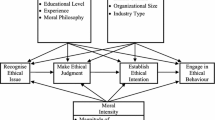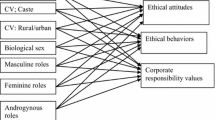Abstract
This article extends previous research by investigating the basis for attitudes toward codes of ethics. Specifically, its purposes are threefold. First, to examine business managers’ attitudes toward codes of ethics. Second, to ascertain whether gender differences do exist with respect to these attitudes. Third, to provide a benchmark for future studies of attitudes toward codes of ethics. A survey of 286 managers revealed significant differences between the female and male managers with respect to six of the eight variables studied.
Similar content being viewed by others
References
Adams, J., A. Tashchian and T. Shore: 2001, ‘Codes of Ethics as Signals for Ethical Behavior’, Journal of Business Ethics 29(3), 199–211.
Aguilar, F.: 1994, Managing Corporate Ethics: Learning from America’s Ethical Companies How to Supercharge Business Performance (Oxford University Press, New York, NY).
Albrecht, W. S. and R. J. Sack: 2000, Accounting Education: Charting the Course Through a Perilous Future. Accounting Education Series, Vol. 16 (American Accounting Association, Sarasota, FL).
Ambrose, M. and S. Schminke: 1999, ‘Sex Differences in Business Ethics: The Importance Of Perceptions’, Journal of Managerial Issues 11(4), 454-464.
Barnett, J.H. and M. Karson: 1989, ‘Managers, Values and Executive Decisions: An Exploration of the Role of Gender, Career Stage, Organizational Level, Function and the Managerial Decision Making’, Journal of Business Ethics 8(10), 747-771.
Becker, H. and D. Fritzsche: 1987, ‘A Comparison of Ethical Behaviour of American, French and German Managers’, Columbia Journal of World Business 19(Winter), 87-95.
Boiral, O.: 2003, ‘The Certification of Corporate Conduct: Issues and Prospects’, International Labour Review 142(3), 317-340.
Bondy, K., D. Matten and J. Moon: 2004, ‘The Adoption of Voluntary Codes of Conduct in MNCs: A Three-Country Comparative Study’, Business and Society Review 109(4), 449–477.
Boo, E. H. Y. and H. C. Koh: 2001, ‘The Influence of Organizational and Code-supporting Variables on the Effectiveness of a Code of Ethics’, Teaching Business Ethics 5(4), 357–373.
Browning, J. and N. Zabriskie: 1983, ‘How Ethical are Industrial Buyers? Industrial Marketing Management 12(4), 219-224.
Brytting, T.: 1997, ‘Moral Support Structures in Private Industry – The Swedish Case’, Journal of Business Ethics 16(7), 663–697.
D’Aquila, J.: 2001, ‘Financial Accountants’ Perceptions of Management’s Ethical Standards’, Journal of Business Ethics 31(3, Part I), 233-244.
Das, T.: 2005, ‘How Strong are the Ethical Preferences of Senior Business Executives?’ Journal of Business Ethics 56(1), 69-80.
Dawson, L.: 1997, ‘Ethical Differences Between Men and Women in the Sales Profession’, Journal of Business Ethics 16(11), 1143-1152.
Deshpande, S. P., J. Joseph, and V. V. Maximov: 2000, ‘Perceptions of Proper Ethical Conduct of Male and Female Russian Managers’, Journal of Business Ethics 24(2), 179–183.
Emmelhainz, M. A. and R. J. Adams: 1999, ‘The Apparel Industry Response to ‘‘Sweatshop’’ Concerns: A Review and Analysis of Codes of Conduct’, Journal of Supply Chain Management 35(3), 51–57.
Farrell, H. and B. Farrell: 1998, ‘The Language of Business Codes of Ethics: Implications of Knowledge and Power’, Journal of Business Ethics 17(6), 587–601.
Fisher, J.D. and R. Baron: 1982, ‘An Equity-Based Model of Vandalism’, Population and Environment 5(3), 182-200.
Franke, G., D. Crown and D. Spake: 1997, ‘Gender Differences in Ethical Perceptions of Business Practices: A Social Role Theory Perspective’, Journal of Applied Psychology 82(6), 920-934.
Fulmer, R.F.: 2004, ‘The Challenge Of Ethical Leadership’, Organizational Dynamics 33(3), 307-317.
Gandz, J. and N. Hayes: 1988, ‘Teaching Business Ethics’, Journal of Business Ethics 7(9), 657-669.
Gaumnitz, B. and J. Lere: 2002, ‘Contents of Codes of Ethics of Professional Business Organizations in the United States’, Journal of Business Ethics 35(1), 35–49.
Gilligan, C.: 1982, In a Different Voice: Psychological Theory and Women’s Development (Harvard University Press, Cambridge, MA).
Gilligan, C. and J. Attanucci: 1994, ‘Two Moral Orientations: Gender Differences and Similarities’, in B. Puka (ed.), Caring Voices and Women’s Moral Frames: Gilligan’s view (Garland, NY), pp. 123–137.
Greenberg, J., and K. Scott: 1996 ‘Why Do Workers Bite the Hand that Feeds Them? Employee Theft As A Social Exchange Process’, In B.M. Staw & L.L. Cummings (eds.), Research in Organizational Behavior (JAI Press, Greenwich, CT), 111-156.
Harrington, S. J.: 1996, ‘The Effect of Codes of Ethics and Personal Denial of Responsibility on Computer Abuse Judgments and Intentions’, MIS Quarterly (September), 257–278.
Harter, S.: 2002, ‘Authenticity’, In C. R. Snyder, & S. Lopez (eds.), Handbook of Positive Psychology (Oxford University Press: Oxford, UK), 382-394.
Hathaway, J. W.: 1990, ‘Students Teach Business a Lesson’, Business and Society Review 72(Winter), 58-61.
Hemingway, C. A. and P. W. Maclagan: 2004, ‘Managers’ Personal Values as Drivers for Corporate Social Responsibility’, Journal of Business Ethics 50(1), 33–44.
Jaffee, S. and J. S. Hyde: 2000, ‘Gender Differences in Moral Orientation: A Meta-analysis. Psychological Bulletin 126(5), 703-726.
Jones, S. and K. Hiltebeitel: 1995, ‘Organizational Influence in a Model of the Moral Decision Process of Accountants’, Journal of Business Ethics 14(6), 417-431.
Kaptein, M.: 2004, ‘Business Codes of Multinational Firms: What Do They Say?’, Journal of Business Ethics 50(1), 13–31.
Kelley, S. W, 0. C. Ferrell, and S. J. Skinner: 1990, ‘Ethical Behavior among Marketing Researchers: An Assessment of Selected Demographic Characteristics’, Journal of Business Ethics 9(8), 681-688.
Kemper, T.: 1966, ‘Representative Roles and the Legitimization of Deviance’, Social Problems 13, 288-298.
Kidwell, J., R. Stevens and R. Bethke: 1987, ‘Differences in Ethical Perceptions Between Male and Female Managers: Myth or Reality?’, Journal of Business Ethics 6(6): 489-493.
Kohlberg, L.: 1969, ‘Stage and Sequence: The Cognitive-Developmental Approach to Socialization’, In D. Goslin (ed.), Handbook of Socialization Theory and Research (Rand McNally, Chicago), pp. 347–480.
Kohlberg, L.: 1984, ‘The Relationship of Moral Judgment to Moral Action, Morality, Moral Behavior and Moral Development’ (John Wiley & Sons, New York, NY).
Kolk, A. and R. van Tulder : 2002, ‘The Effectiveness of Self-regulation: Corporate Codes of Conduct and Child Labour’, European Management Journal 20(3), 260–271.
Lamsa, A., M. Vehkaperä, T. Puttonen, and H. Pesonen: 2008, ‘Effect of Business Education on Women and Men Students’ Attitudes on Corporate Responsibility in Society’, Journal of Business Ethics 82(1), 45-58.
Lefebvre, M. and J. B. Singh: 1996, ‘A Comparison of the Contents and Foci of Canadian and American Corporate Codes of Ethics’, International Journal of Management 13(2), 156–170.
Luthans, F. and B. Avolio: 2003, ‘Authentic Leadership: A Positive Developmental Approach’ In K. Cameron, J. Dutton, and R. Quinn (eds.), Positive Organizational Scholarship, (Berrett-Koehler, San Francisco), 241-258.
May, D. R., T. Hodges, A. Chan and B. Avolio: 2003, ‘Developing the Moral Component of Authentic Leadership’, Organizational Dynamics 32(3), 247–260.
Meyer, J. and B. Rowan: 1977, ‘Institutional Organizations: Formal Structure as Myth and Ceremony’, American Journal of Sociology 83(2), 340-363.
Montoya, I. D. and A. J. Richard: 1994, ‘A Comparative Study of Codes of Ethics in Health Care Facilities and Energy Companies’, Journal of Business Ethics 13(9), 713–717.
Morgan, R.B.: 1993, ‘Self- and Co-Worker Perceptions of Ethics and their Relationships to Leadership and Salary’, Academy of Management Journal 36(1), 200-214.
Nguyen, N., M. Basuray, W. Smith, D. Kopka, and D. McCulloch: 2008, ‘Moral Issues and Gender Differences in Ethical Judgment using Reidenbach and Robin’s (1990) Multidimensional Ethics Scale: Implications in Teaching of Business Ethics’, Journal of Business Ethics 77(4), 417-430.
Nwachukwu, S. L. S. and S. J. Vitell, Jr.: 1997, ‘The Influence of Corporate Culture on Managerial Ethical Judgments’, Journal of Business Ethics 16(8), 757–776.
Palmer, D. and Zakhem, A.: 2001, ‘Bridging the Gap Between Theory and Practice: Using the 1991 Federal Sentencing Guidelines as a Paradigm for Ethics Training’, Journal of Business Ethics 29(1/2), 77-84.
Peppas, S.: 2003, ‘Attitudes Toward Codes of Ethics: The Effects of Corporate Misconduct’, Management Research News 26(6), 77-99.
Pierce, M. and J. Henry: 2000, ‘Judgments About Computer Ethics: Do Individual, Co-Worker, and Company Judgments Differ?’, Journal of Business Ethics 28(4), 307–22.
Preble, J. F. and R. C. Hoffman: 1999, ‘The Nature of Ethics Codes in Franchise Associations Around the Globe’, Journal of Business Ethics 18(3), 239–253.
Radtke, R. R.: 2000, ‘The Effects of Gender and Setting on Accountants’ Ethically Sensitive Decisions’, Journal of Business Ethics 24(4), 299-312.
Reidenbach, R. E. and D. P. Robin: 1990, ‘Toward the Development of a Multidimensional Scale for Improving Evaluations of Business Ethics’, Journal of Business Ethics 9(8), 639–653.
Robin, D. and Babin, L.: 1997, ‘Making Sense of the Research on Gender and Ethics in Business: A Critical Analysis and Extension’, Business Ethics Quarterly 7(4), 61-90.
Schneider, B., H. Goldstein, and D. Smith: 1995, The ASA Framework: An Update’, Personnel Psychology 48(4), 747-779.
Schwartz, M.: 2001, ‘The Nature of the Relationship Between Corporate Codes of Ethics and Behavior’, Journal of Business Ethics 32(3), 247–62.
Shaub, M.: 1994, ‘An Analysis of the Association of Traditional Demographic Variables with the Moral Reasoning of Auditing Students and Auditors’. Journal of Accounting Education 12(1), p. 1-26.
Simga-Mugan, C., B. Daly, D. Onkal and L. Kavut: 2005, ‘The Influence of Nationality and Gender on Ethical Sensitivity: An Application of the Issue-contingent Model,’ Journal of Business Ethics 57(2), 139-152.
Somers, M.: 2001, ‘Ethical Codes of Conduct and Organizational Context: A Study of the Relationship Between Codes of Conduct, Employee Behavior and Organizational Values’, Journal of Business Ethics 30(2), 185–95.
Stevens, B.: 2008, ‘Corporate Ethical Codes: Effective Instruments for Influencing Behavior’, Journal of Business Ethics 78(4), 601-609.
Stohs, J. H. and T. Brannick: 1999, ‘Codes and Conduct: Predictors of Irish Managers’ Ethical Reasoning’, Journal of Business Ethics 22(4), 311–326.
Suchman, M. C: 1995, ‘Managing legitimacy: Strategic and institutional approaches’, Academy of Management Review 20(3), 571-610.
Valentine, S. and T. Barnett: 2002, ‘Ethics Codes and Sales Professionals’ Perceptions of Their Organizations’ Ethical Values’, Journal of Business Ethics 40(3), 191–200.
Valentine, S. and T. Barnett: 2003, ‘Ethics Code Awareness, Perceived Ethical Values, and Organizational Commitment’, Journal of Personal Selling and Sales Management 23(4), 359–367.
Valentine, S., and G. Fleischman: 2007, ‘Ethics Programs, Perceived Corporate Social Responsibility and Job Satisfaction’, Journal of Business Ethics 77(2), 159-172.
Valentine, S., and G. Fleischman: 2008, ‘Ethics Programs, Perceived Corporate Social Responsibility and Job Satisfaction’, Journal of Business Ethics 77(2), 159-172.
Van Tulder, R. and A. Kolk: 2001, ‘Multinationality and Corporate Ethics: Codes of Conduct in the Sporting Goods Industry’, Journal of International Business Studies 32(2), 267–283.
Weaver, G. R., L. K. Trevino and P. L. Cochran: 1999, ‘Corporate Ethics Programs as Control Systems: Influences of Executive Commitment and Environmental Factors’, Academy of Management Journal 42(1), 41–57.
Webley, S. and A. Werner: 2008, ‘Corporate Codes of Ethics: Necessary but not Sufficient’, Business Ethics: A European Review 17(4), 405-415.
Weeks, W.A., C. Moore, J. McKinney and J. Longenecker: 1999, ‘The Effects of Gender and Career Stage on Ethical Judgment’, Journal of Business Ethics 20(4), 301-313.
Author information
Authors and Affiliations
Corresponding author
Rights and permissions
About this article
Cite this article
Ibrahim, N., Angelidis, J. & Tomic, I.M. Managers’ Attitudes Toward Codes of Ethics: Are There Gender Differences?. J Bus Ethics 90 (Suppl 3), 343–353 (2009). https://doi.org/10.1007/s10551-010-0428-y
Published:
Issue Date:
DOI: https://doi.org/10.1007/s10551-010-0428-y




